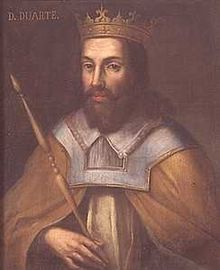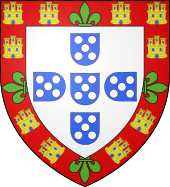Eduard (Portugal)
Eduard I. ( Dom Duarte I ) KG (born October 31, 1391 ; † September 9, 1438 ) was the eleventh king of Portugal from 1433 to 1438 , the second from the house of Avis .
Life
Eduard - also known under the name of the Philosopher King (he had written a philosophical pamphlet on the destiny of man called “The Loyal Counselor” (O leal conselheiro)) - was the son of King John I and his wife Philippa of Lancaster born. He ruled from August 15, 1433 - the day before his father had died - until his death in 1438.
Edward's brief reign was unsuccessful. His predecessor, John I, had been forced to give large estates to the nobility in order to secure the support of the nobility in the fight against Castile (cf. Revolution of 1383 , Battle of Aljubarrota ). Eduard now tried to win back at least part of these lands for the crown. In 1434 he issued a decree that the crown would automatically inherit all land as soon as a country nobleman died without a male heir. This decree brought him into conflict with the landed gentry.
An attempt to conquer Tangier from the Moors ended in disaster in 1437. His brother Heinrich the Navigator , who commanded the Tangier campaign, had to surrender to the overwhelming Arab forces. Part of the surrender provisions was that Portugal should return Ceuta to the Moors. To vouch for this provision, Prince Ferdinand , another of the king's younger brothers, had to be held hostage to the Moors. Eduard was now faced with the difficult question of whether or not he should save his brother and thereby give up the city of Ceuta. He passed this question on to the Cortes , the Portuguese aristocratic parliament. However, no decision was made, as the king died of the plague in 1438 . Prince Ferdinand remained in captivity until his death.
Edward's early death triggered a crisis. His son and successor, Alfons V, was still a minor when his father died, so that the country had to be administered by a regency first. This was initially transferred to Edward's widow, but was soon taken over by another of Edward's brother, Peter of Portugal . Only after ten years of reign did Edward's son manage to beat his uncle and take over power himself.
family
Eduard was married to Eleanor of Aragón (* 1402 - 19 February 1445), a daughter of King Ferdinand I of Aragon.
With her he had 4 sons and 5 daughters:
- Johann (* 1429; † 143?)
- Philippa (27 November 1430 - 24 March 1439). She died of the plague.
- Alfonso V (January 15, 1432 - August 28, 1481); Heir to the throne
- Maria (7 December 1432 - 8 December 1432)
- Ferdinand (born November 17, 1433; † September 18, 1470), first Duke of Beja and second Duke of Viseu, father of Manuel I (Portugal)
- Eleonore Helena (September 18, 1436 - September 3, 1467), she married the Roman-German Emperor Friedrich III in 1452 .
- Eduard (July 12, 1435; † 143?)
- Katharina (born November 26, 1436; † June 17, 1463), nun in the Convent of the Poor Clares in Lisbon
- Johanna (* March 20, 1439; † June 13, 1475), she married King Henry IV of Castile in 1455
Before the marriage he already had an illegitimate son with the Castilian noblewoman Juana Manuel, namely Johann Manuel (* 1420, † 1476), the future bishop of Guarda.
See also: History of Portugal , Timeline Portugal , Portugal under the House of Avis
Web links
literature
- Peter Feige / Dietrich Briesemeister: Eduard . In: Lexicon of the Middle Ages (LexMA). Volume 3, Artemis & Winkler, Munich / Zurich 1986, ISBN 3-7608-8903-4 , Sp. 1594–1596.
| predecessor | Office | successor |
|---|---|---|
| Johann I. |
King of Portugal 1433–1438 |
Alfons V. |
| personal data | |
|---|---|
| SURNAME | Eduard |
| ALTERNATIVE NAMES | Edward I of Portugal; Dom Duarte I. |
| BRIEF DESCRIPTION | King of Portugal (1433–1438) |
| DATE OF BIRTH | October 31, 1391 |
| DATE OF DEATH | September 9, 1438 |

